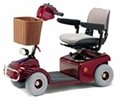
Sleep and the Elderly
Information and Resources
Sleep and the elderly can be a frustrating issue for both your elderly parents and you.
In fact, sleep (and lack of sleep) is a touchy subject at any age!
People remember all the times in their lives sleep has been difficult.
As people age, unfortunately, they get less and less deep restorative sleep.
They may get up frequently through the night or they may have difficulty getting to sleep in the first place.
I've spoken to many seniors that awaken at odd hours in the morning and have no success falling asleep again.
Lack of sleep can even result in feeling a little confused and "foggy" and is not fun for anyone!
Importance of Sleep
People young and old need sleep for both our physical and emotional well being.
Elderly who are not sleeping will often have attention and memory problems, excessive daytime sleeping and/or have depression.
The symptoms of lack of sleep can also be mistakenly interpreted as signs of dementia or cognitive impairment.
How Much Sleep Do Elderly Need?
Healthy seniors need between 6-9 hours of sleep per night.
But everyone is different and it's more important to pay attention to how the senior feels after a night's sleep.
Causes of Poor Sleep
There are a number of causes of poor sleep and the elderly:
Stress:
Significant life changes can cause sleeping problems in the elderly.
Unfortunately, the elderly often go through many life changes that can cause stress including loss of a spouse, loss of friends or loss of independence (due to mobility or having a driver's licence taken away).
Many of these significant life changes can cause stress, which can lead to elderly depression.
Lack of Exercise:
Not exercising, even just a short walk, can cause sleeping problems.
If seniors have not been the type to exercise earlier in life, it certainly can be a challenge to motivate them to do exercise.
However, it is proven that regular exercise - at least 3 hours before bedtime - can improve sleep.
This statistic might be a good one to help with motivation. I'm sure consistent lack of sleep can motivate almost anyone to try almost anything!
A senior starting a new exercise regime should give it a good shake to see if it will help with sleep - at least 1-2 months.
The elderly will usually find exercise will improve many areas of their life and they will feel better. There is also extensive research that shows that exercise helps to prevent developing cognitive issues as well.
For some simple at home exercises to start with: Exercises for the Elderly.
Poor Sleep Habits:
Sleep and the elderly is often influenced by poor sleeping habits that can contribute to a bad night's sleep.
Some of these include:
- Sleeping irregular hours
- Having varied times for bedtime and waking time
- Consuming alcohol before sleeping
- Consuming caffeine before sleeping
- Consuming sugary or spicy food before sleeping
- Falling asleep with the TV on
- Excessive sleep during the day
Pain or Poor Health:
It's no surprise that pain and poor health affects sleep.
Try to make the senior as comfortable and pain free as possible to enable quality sleep.
A way to improve comfort might be considering a hospital adjustable bed if this would increase comfort.
Sleep promotes healing and is needed to recover from illness.
Medications:
If your elderly loved one is having issues with sleep, check with their doctor if this is one of the side effects of their medication.
Medications have different side effects and it may be worth asking the doctor to change the prescription to a different drug as it may have less impact on your parents sleeping pattern.
For more information on sleep and the elderly: Elderly Insomnia
Strategies to Sleep Better
- Drink hot water with lemon or warm milk before going to bed
- Exercise and get fresh air during the day (but not in the hours before bedtime)
- Get up and go to bed at the same time everyday
- Do not drink caffeinated drinks in the evening
- Do not drink alcohol before bed
- Do not take naps during the day or limit them to short periods
- Try to avoid TV before bed
- Instead, take a bath, read or listen to music before going to bed
- Make sure the bedroom is dark
- Make sure the bedroom is quiet and cool
- Don't read from a backlit source (computer, ipad, etc) before bedtime
- Move clocks out of view
- Limit smoking (quitting is even better!)
- Limit use of sleeping pills and aids
- Seek help if you are experiencing stress, anxiety or elderly depression
- Reserve the bedroom only for sex and sleep
Note: you may need the advice of your pharmacist or family doctor about how to go about reducing the amount of sleeping pills used. They may suggest alternate medications as some of the side effects can be issues with sleep.
Return to Elderly Health Problems
Return to Caring for Aging Parents






New! Comments
Have your say about what you just read! Leave me a comment in the box below.